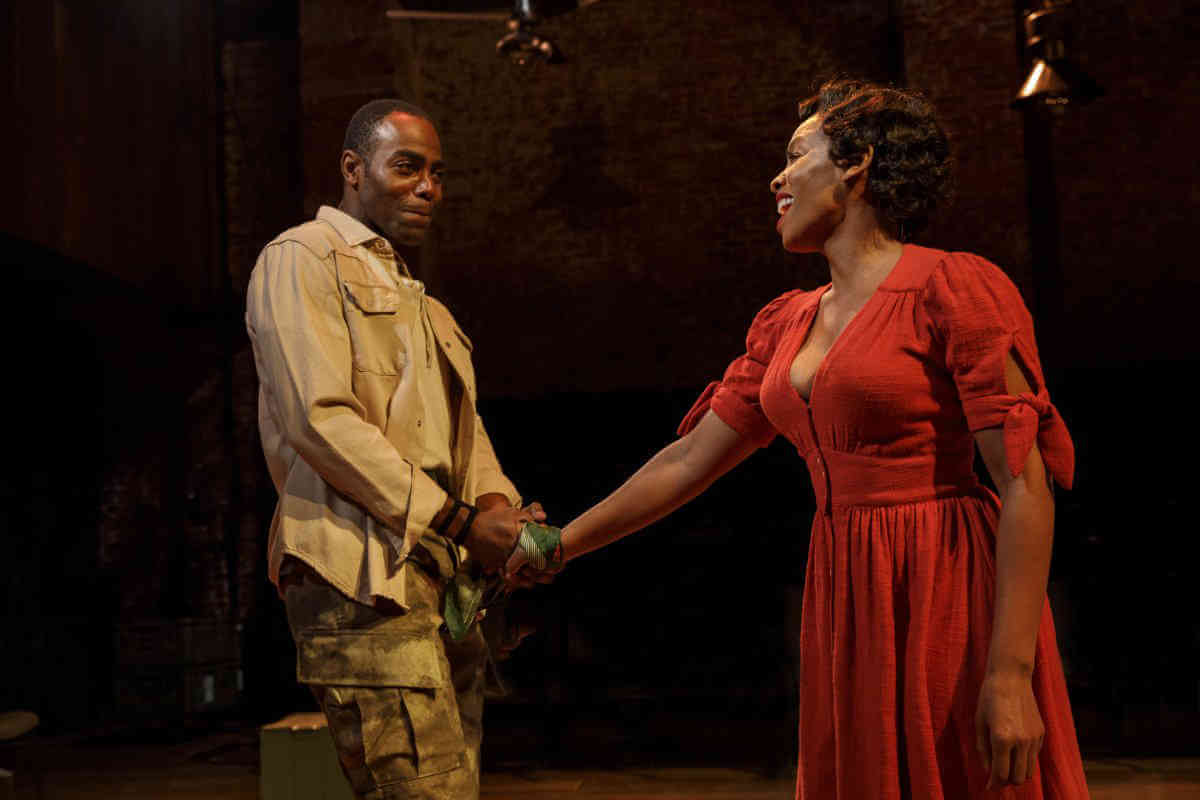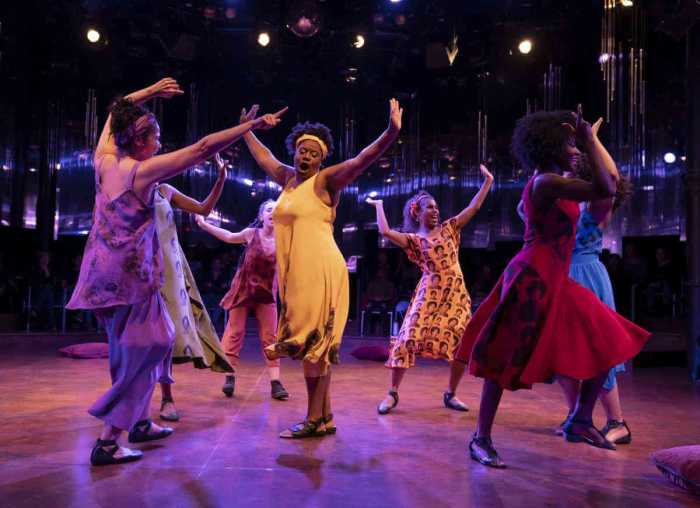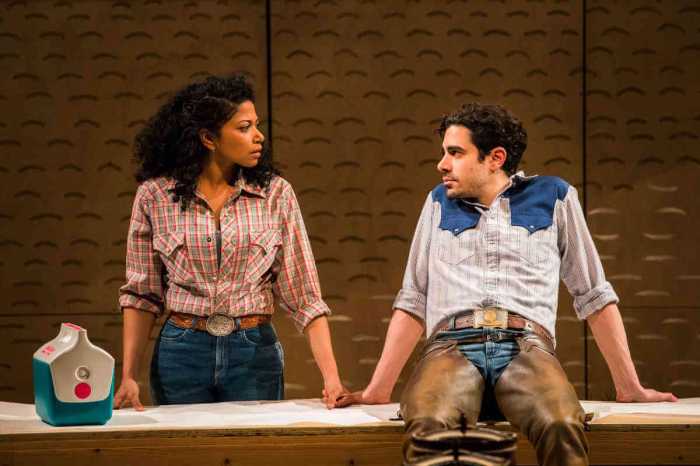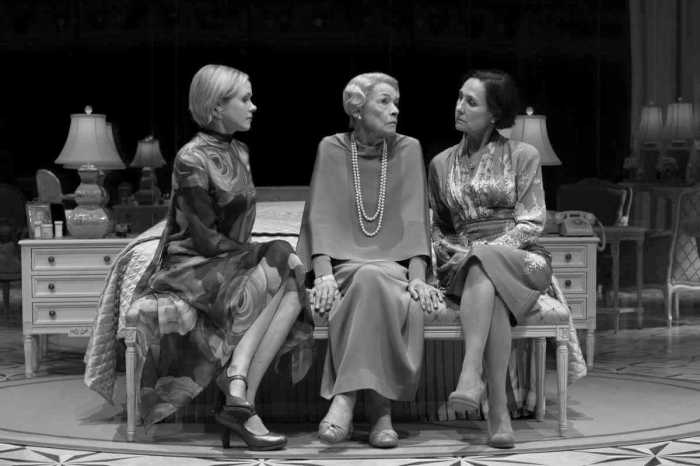If you make no other theater plans in the next couple of weeks, do whatever you can to catch “Carmen Jones” at Classic Stage Company. This spectacular, intimate production of what has long been a problematic work is fresh, vibrant, and alive with extraordinary talent and emotion. John Doyle has stripped the show down to its essential humanity and the result is powerful and moving in a way that recalls the novels of Steinbeck.
The show was originally presented in 1943, and it’s a retelling of Bizet’s “Carmen,” with his music and new lyrics by Oscar Hammerstein II. Set in a military parachute factory and in Chicago during World War II, Carmen is a sexualized troublemaker who seduces the innocent Joe, a soldier sent to escort her to jail. Carmen manages to lead him away from his hometown sweetheart Cindy Lou and also escape, only to later abandon Joe to run away with the boxer Husky Miller. Joe follows Carmen to Chicago and, after many altercations, kills her in a jealous rage. The worlds of both the factory and the big city are fleshed out by company of 10 taking on many different roles.
Doyle has cut the show down to 95 minutes and given it an accumulating tension that will keep you on the edge of your seat. The score has new orchestrations for six musicians, yet the sound is rich and resonant in the CSC space.
The company is uniformly magnificent. Anika Noni Rose gives Carmen Jones a passionate ferocity amplified through her glorious voice. Clifton Duncan is splendid as Joe, and his beautifully etched suffering broke my heart. Lindsay Roberts as Cindy Lou brings an innocence and ethereal quality to the role that stand in perfect counterpoint to Carmen. David Aron Damane as Husky Miller is a powerful bass who exudes a kind of idealized masculinity that is at once both inspiring and a comment on the appeal celebrity exerts on Carmen and the others.
Music director Shelton Becton has elicited top-notch performances from the entire company. The choreography by Bill T. Jones is beautifully scaled to the space and brilliantly speaks to a sexually charged world. Ann Hould-Ward’s costumes play a vital role in bringing the world of the show alive on Scott Pask’s simple wooden set.
The economy, focus, and emotional impact of this production reminded me of another “Carmen” I saw in 1983. To this day, I remember Peter Brook’s production at Lincoln Center performed in a dirt-filled bullring. I expect I’ll recall this “Carmen Jones” for the next 35 years.
It’s asking an awful lot of a gay audience, in particular, that they have have sympathy for someone who said, “If we cannot have moral feelings against homosexuality, can we have it against murder? Can we have it against other things?” Yet, that is exactly the goal of John Strand’s play “The Originalist,” now at 59E59.
The play seeks to portray late Supreme Court Justice Antonin Scalia as a gruff-but-loveable grandpa figure who despite his animus toward the gay community was a good man underneath. In doing this, the playwright says in a program note, “What does it cost us to suppress our fear and distrust, rise from our own bunkers of certainty and dogma, take a step toward the middle, and sit down with the monsters?” Well, for one it would take an honest play, which this decidedly is not.
Scalia reportedly hired liberal clerks to foster debate in his office. Fair enough. Strand, however, has created fictional characters who serve his dramatic ends but are false and contrived, as is the plot. He chooses as Scalia’s nemesis a black lesbian straight out of an elite law school. Rather than arguing about what the legal doctrine of originalism means in the context of a changing world, which might actually be an interesting if highly polemical play, Strand has written a tedious sitcom where Scalia is a jovial curmudgeon who introduces his clerk, Cat, to guns while she tries to get him to temper his disgust toward homosexuals. Interspersed in this is a plot about Cat wanting to please her father who lies dying in a coma, and Scalia rushing to comfort her. There’s also a white, male law clerk, Brad, who is aggressively right wing, sycophantic to Scalia, and sexist with Cat. In other words, he’s a tired stereotype we’ve seen too much of. There are some attempts at humor, but they are “dad jokes” that fall flat.
As for the character of Cat, one might accuse playwright Strand of cultural appropriation if all the characters weren’t half-written and shallow. Other than Cat being threatened with outing by Brad and her subsequent confession to Scalia who, we find, already knew, there is nothing in the writing that speaks to the black or lesbian experience. Cat is nothing more than a shallow device to argue that this Scalia’s morality is situational. The effort backfires and makes him even more offensive.
Given how poorly written the characters are, one can almost forgive the bland, undeveloped performances. Tracy Ifeachor as Cat relies mostly on attitudes and pulling faces, underscoring that there really isn’t a believable character for her to inhabit. Brett Mack as Brad is equally general and tiresome as befits the stereotype. Edward Gero as Scalia is insufferable, as he attempts to swing from grousing grump to generous gramps with neither depth nor subtlety. Worse yet, Molly Smith’s turgid direction makes the 90 minutes more grueling than it needs to be.
Ultimately, who cares what Scalia was like as a person? What matters is how Scalia’s public words and decisions shaped the culture and sought constitutional justification for bigotry and inequality. In that respect, Scalia was a monster. No little play is going to change that.
“Relentless” is hardly a flattering term to apply to a revue. But that’s the only one that seems to describe the aggressive, if not assaultive, “Smokey Joe’s Café,” now getting a revival at Stage 42. The show is comprised of 40 sings by Leiber and Stoller that pounds away at the audience for 90 minutes. There is no break between the songs, and each one is performed with an almost identical full-on belt. Emotional ballad or rollicking comic song, they’re all the same.
Given this, fatigue sets in early on, and the songs become indistinguishable from one another. One would have expected more from director and choreographer Joshua Bergasse, who has guided his company into a whole lot of mugging and predictable, uninspired movement. Sound designer Peter Fitzgerald doesn’t get a pass either. The amplification is a wall of sound throughout and is so high at times that it distorts the voices, making the lyrics incomprehensible.
That said, the cast is mostly very good. John Edwards does a wonderful job with “I Who Have Nothing,” which is one of the only authentic emotional moments in the show. Nicole Vanessa Ortiz has an extraordinary voice, but she repeats the same vocal figures again and again. Less would definitely have been more. Dwayne Cooper has a remarkable, versatile bass, and Kyle Taylor Parker delivers some of the only comedy that lands.
This is a show so desperate to please that it ends up trying too hard, undermining its intention to entertain and making this one café you might want to avoid.
CARMEN JONES | Classic Stage Company, 136 E. 13th St. | Through Aug. 19: Tue.-Thu. at 7 p.m.; Fri.-Sat. at 8 p.m.; Sat.-Sun. at 3 p.m. | $72-$127 at classicstage.org or 866-811-4111 | One hr., 35 mins., | no intermission
THE ORIGINALIST | 59E59, 59 E. 59th St. | Through Aug. 19: Tue.-Sat at 7 p.m.; Sat-Sun. at 2 p.m. | $70 at ticketcentral.com or 212-753-5959 | One hr., 30 mins., | no intermission
SMOKEY JOE’S CAFÉ | Stage 42, 422 W. 42nd St. | Mon.-Tue., Thu. at 7 p.m.; Fri.-Sat. at 8 p.m.; Sun. at 7:30 p.m.; Sat.-Sun. at 3 p.m. | $59-$109 at telecharge.com or 212-239-6200 | One hr., 30 mins. | no intermission



































